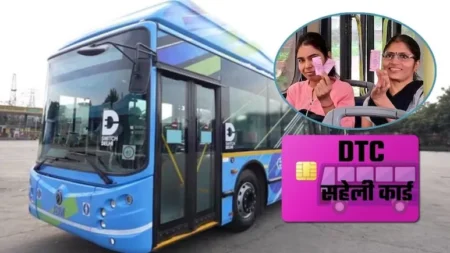- Home
- Latest News
- DTC to launch pink smart cards for women, transgender passengers on Bhai Dooj

DTC to launch pink smart cards for women, transgender passengers on Bhai Dooj
In a landmark move, the Delhi Transport Corporation (DTC) plans to roll out a pink smart card — to be called the Saheli card — for women and transgender commuters in the national capital, timed with the festival of Bhai Dooj.
What Is the Pink Smart Card (Saheli)?
- The pink smart card will replace the current paper-based pink tickets, introduced in 2019, that permit free bus travel for women under Delhi’s free bus rides scheme.
- This digital pass will be a permanent travel pass — valid for life — allowing holders to tap and ride without needing paper slips or tickets.
- The card is being developed under the National Common Mobility Card (NCMC) framework and will also support recharges for use across other public transport modes like the Delhi Metro.
Eligibility and Application Process
- Only women and transgender residents of Delhi will be eligible.
- Applicants must register online via the DTC portal and complete full KYC verification with a partner bank.
- Cards will not be issued directly from DTC counters; they will be sent via postal dispatch once the KYC and verification are complete.
- To prevent abuse and provide accountability to the subsidy model, the free-travel benefit via the pink smart card will be restricted to Delhi residents.
Timeline & Launch Strategy
- Officials indicate that backend integration — connecting buses to card-reading systems — is complete or nearing completion.
- The rollout is slated to begin on Bhai Dooj (October 23, 2025) or soon after, provided the Chief Minister gives her approval.
- The launch will likely be phased, with full activation across all DTC and cluster buses over time.
Also Read: Indoor Decoration Ideas for Diwali: Brighten Up Your Home This Festive Season
Significance & Implications
- Digitisation & Transparency
The pink smart card aims to reduce reliance on paper tickets — potentially minimizing pilferage, fraud, or misuse associated with manual ticketing. - Sustainability & Ease
A tap-and-go system offers convenience to commuters, eliminating the hassle of carrying or requesting pink slips and simplifying boarding. - Focus on Accountability
Restricting benefits to Delhi residents ensures subsidy is targeted and reduces burden on state resources. - Potential for Multi-modal Integration
Since the card works under the NCMC framework, it may be adapted in future for integrated use across Metro, RRTS, or other transit networks.
Challenges & Considerations
- Ensuring Access & Inclusion
Not all women or transgender persons may be digitally literate or have easy access to KYC procedures. Transparent support mechanisms will be needed. - Transition Period Complexity
During rollout, both pink tickets and pink smart cards may coexist, which could create confusion among commuters and conductors alike. - Operational Readiness
Ensuring all buses and devices are properly synced and that the backend system is robust will be crucial for smooth functioning. - Data Privacy & Security
As a system involving personal data, handling KYC, identity, transaction records must follow strong privacy safeguards.
What Commuters Should Know & Do
- Women and transgender Delhi residents should prepare valid identity and address proofs in advance for KYC verification.
- Keep an eye on announcements from DTC and the Delhi government regarding registration launching dates.
- Be prepared to migrate from paper tickets to the smart card system once the rollout begins.
The pink smart card represents a significant step in modernising public transport accessibility for women and transgender individuals in Delhi. When implemented well, it can enhance commuter convenience, bolster transparency, and make sustainable mobility more inclusive.
Also Read: From pink to plastic: Delhi’s buses get Saheli smart card